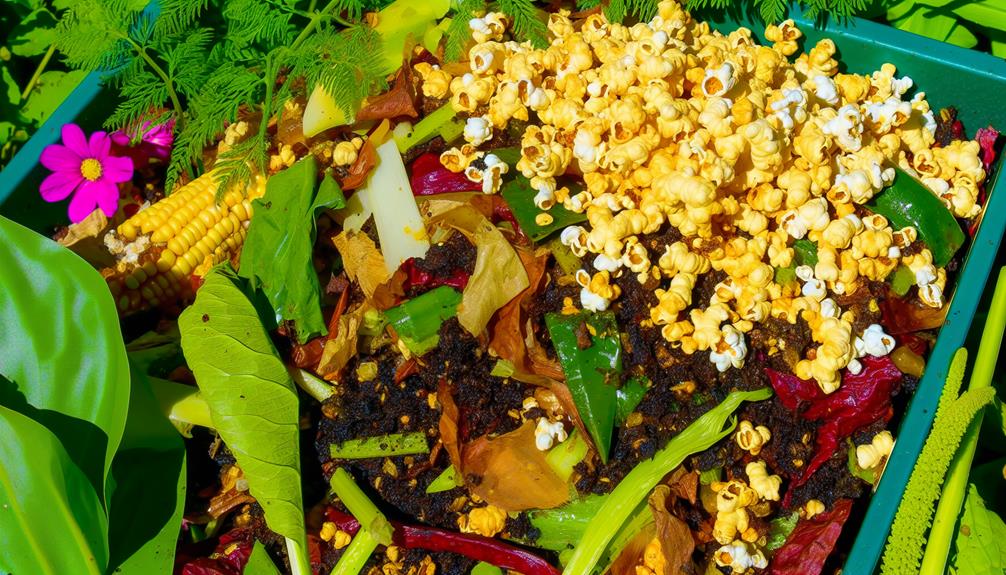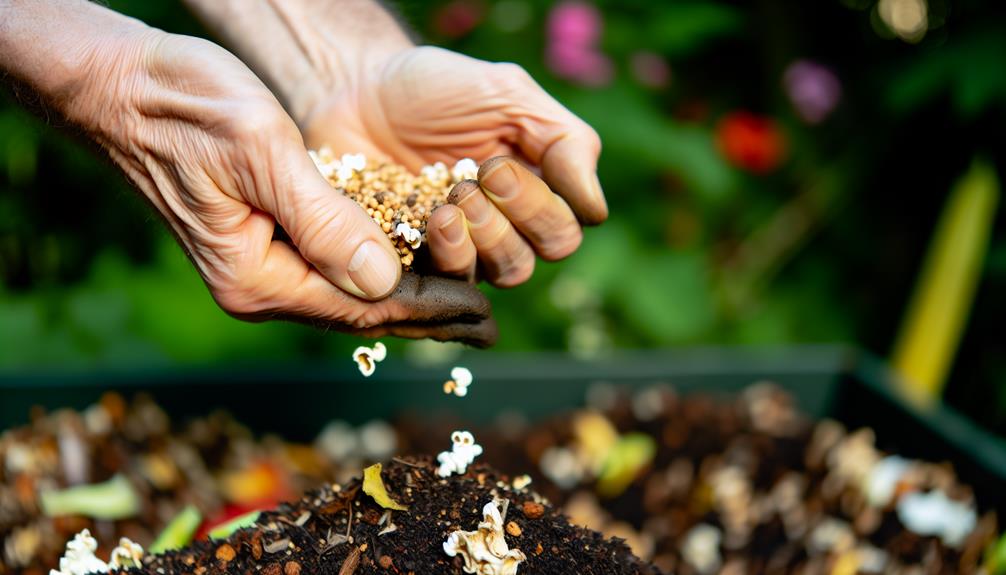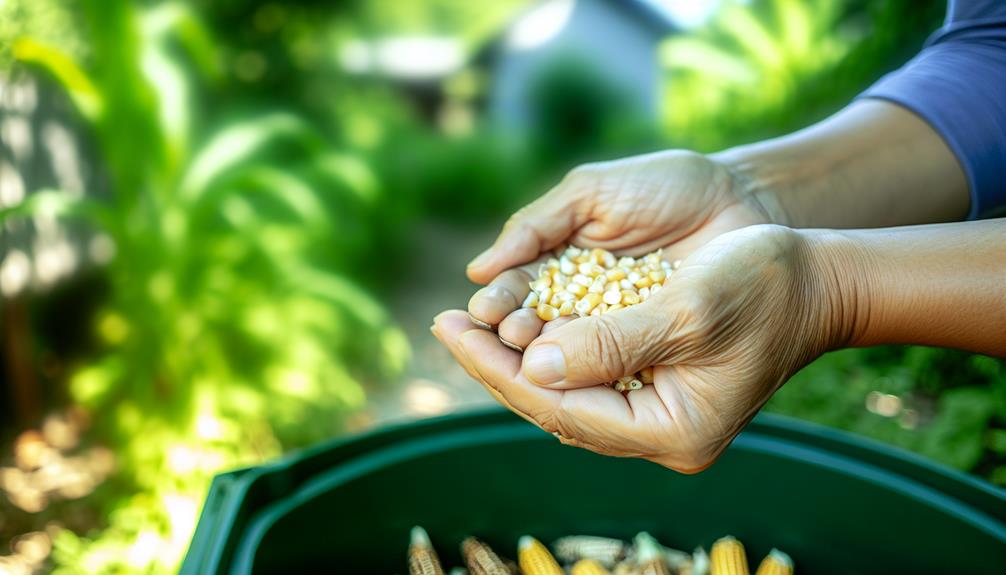

Yes, you can compost unpopped popcorn kernels, but you’ll need to prepare them first. Their hard outer shells make them slow to decompose. To speed up the process, soak the kernels overnight to soften them, then slightly crush them before adding to your compost pile.
Mixing them with other organic waste helps balance the compost and aids microbial activity. This method not only reduces waste but enriches the soil with essential nutrients. If you’re curious about additional disposal methods and benefits, there’s more to explore.
Unpopped popcorn kernels, often called ‘old maids,’ are the stubborn remnants that refuse to burst open during the popping process. Understanding why these kernels don’t pop can help you decide what to do with them.
The kernel composition plays an important role; each popcorn kernel has a hard outer shell called the pericarp and a starchy interior. For a kernel to pop, its moisture content must be around 13-14%. If it’s too low or the pericarp is damaged, the kernel won’t pop.
Popcorn origins trace back thousands of years, with evidence suggesting that ancient civilizations like the Aztecs and Mayans enjoyed this snack. They cultivated specific types of corn that were more likely to pop due to their particular kernel composition. Today, popcorn is a staple snack in many homes, but those pesky unpopped kernels can be a nuisance.
When considering what to do with old maids, it’s important to understand their makeup. Since they consist of the same natural materials as fully popped kernels, they’ve potential in various uses, including composting. However, before diving into composting, it’s crucial to comprehend the specific challenges these kernels might present.
Also Read: Can You Compost Body Wash?
Composting unpopped popcorn kernels poses unique challenges due to their hard outer shell and low moisture content. These factors can make it difficult for kernels to break down and integrate into your compost pile. However, with the right approach, you can overcome these obstacles.
Here are the primary challenges you might face:
To address these challenges effectively, it’s important to tackle them directly. While these kernels can be tougher to compost, they’re not impossible to break down. By understanding and managing their unique properties, you’ll be better equipped to integrate them into your compost pile successfully.
Also Read: Can You Compost Blood?
To prepare kernels for compost, start by soaking them in water overnight to soften their hard outer shell. This step is important as it makes the kernels easier to break down in your compost pile.

After soaking, you’ll want to focus on cleaning kernels thoroughly. Rinse them well to remove any residues or chemicals that might be present.
Once cleaned, check the kernels for any signs of mold or decay, as you don’t want to introduce unwanted pathogens into your compost. If you find any damaged kernels, discard them.
Next, consider crushing the kernels slightly. You can use a rolling pin or a similar tool to gently crack the outer shell. This additional step accelerates the decomposition process, making the kernels integrate more smoothly with other compost materials.
Now that your kernels are prepped, mix them with other organic waste like vegetable scraps and yard clippings. This balanced combination ensures a richer compost.
Also Read: Can You Compost Black-Eyed Peas?
Adding unpopped popcorn kernels to your compost pile offers several advantages for both your garden and the environment. By composting these kernels, you’re contributing to a cycle of sustainability and community wellness.
Here are four benefits you’ll notice:
Also Read: Can You Compost Celery?
If composting isn’t an option, there are other effective ways to dispose of unpopped popcorn kernels. One practical method is to contemplate using the kernels as animal feed. Many bird species and small animals will appreciate the extra food source. Simply scatter the kernels in your yard or add them to a bird feeder. Just make sure they’re not salted or flavored, as additives can be harmful to wildlife.

Another method involves exploring recycling options. While popcorn kernels themselves aren’t typically recyclable, you can look into local facilities that accept organic waste. Some communities offer organic recycling programs where you can drop off items like food scraps, including unpopped popcorn kernels. Checking with your local recycling center can provide you with specific guidelines.
You might also repurpose the kernels in creative ways. For instance, turn them into DIY heating pads by filling a fabric pouch with the kernels and heating it in the microwave. This not only avoids waste but also offers a practical household item.
Yes, unpopped popcorn kernels can attract pests in your compost bin. To enhance pest prevention and compost hygiene, make sure you’re mixing your compost regularly and covering food scraps with brown materials like leaves or cardboard.
You’re wondering about the decomposition rate of unpopped kernels. With good microbial activity in your compost, they might take several months to break down. But don’t worry, your compost community will handle it together!
You’ll need to guarantee the temperature requirements are met and maintain proper moisture levels. Keep your compost between 135-160°F and slightly moist to help those unpopped kernels break down effectively and become part of your community’s compost.
Unpopped kernels can cause pH fluctuations in your compost, impacting microbial activity. You’re part of a community that values balance, so it’s important to monitor and adjust for these changes to maintain a healthy compost.
Flavored or salted unpopped popcorn kernels pose potential health risks and environmental impact when composted. You’re better off avoiding these to keep your compost healthy and safe, ensuring a more sustainable and inclusive environment for all.
So, yes, you can compost unpopped popcorn kernels. Start by crushing the kernels to speed up decomposition.
Mix them into your compost pile with other organic materials. Avoid adding too many at once to maintain balance.
Alternatively, consider using them as bird feed or in crafting projects. With a little preparation, unpopped kernels can be a beneficial addition to your compost, enriching your garden soil over time.
Always remember to manage your compost pile effectively.
